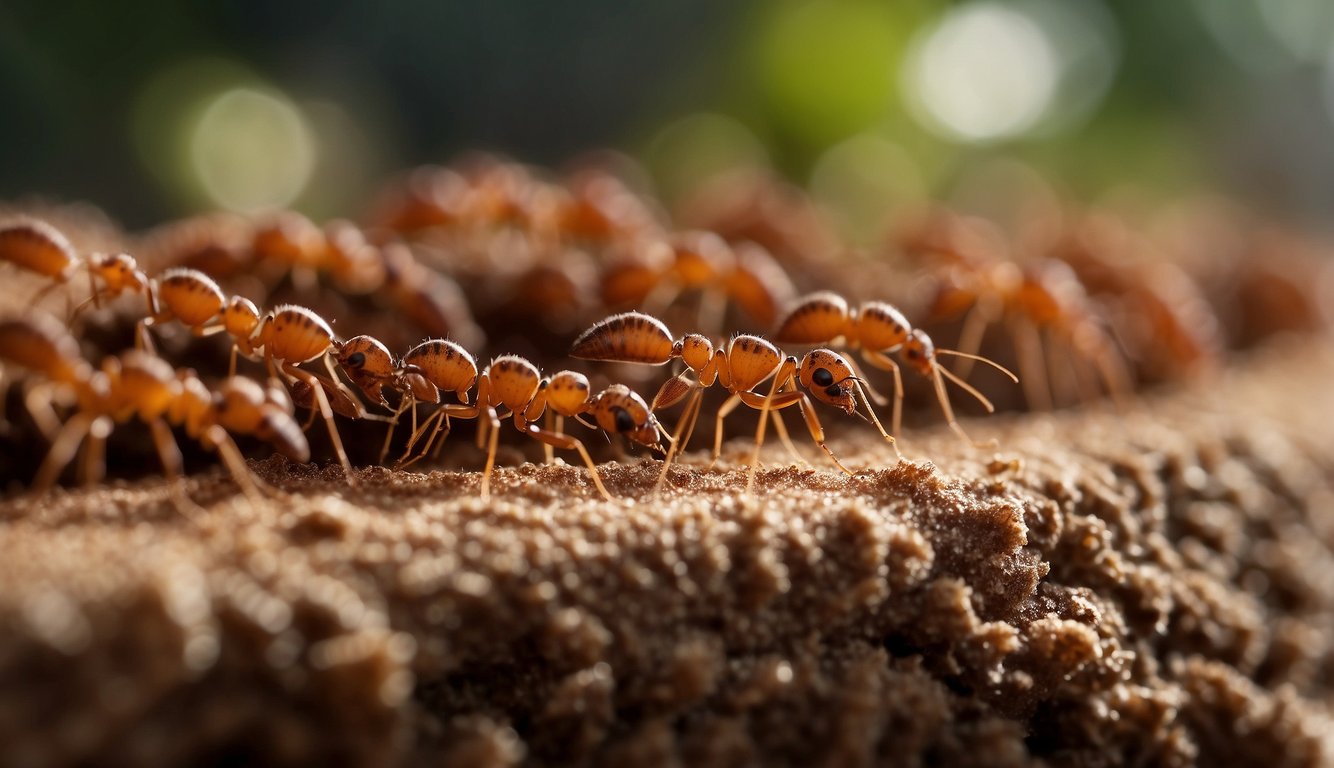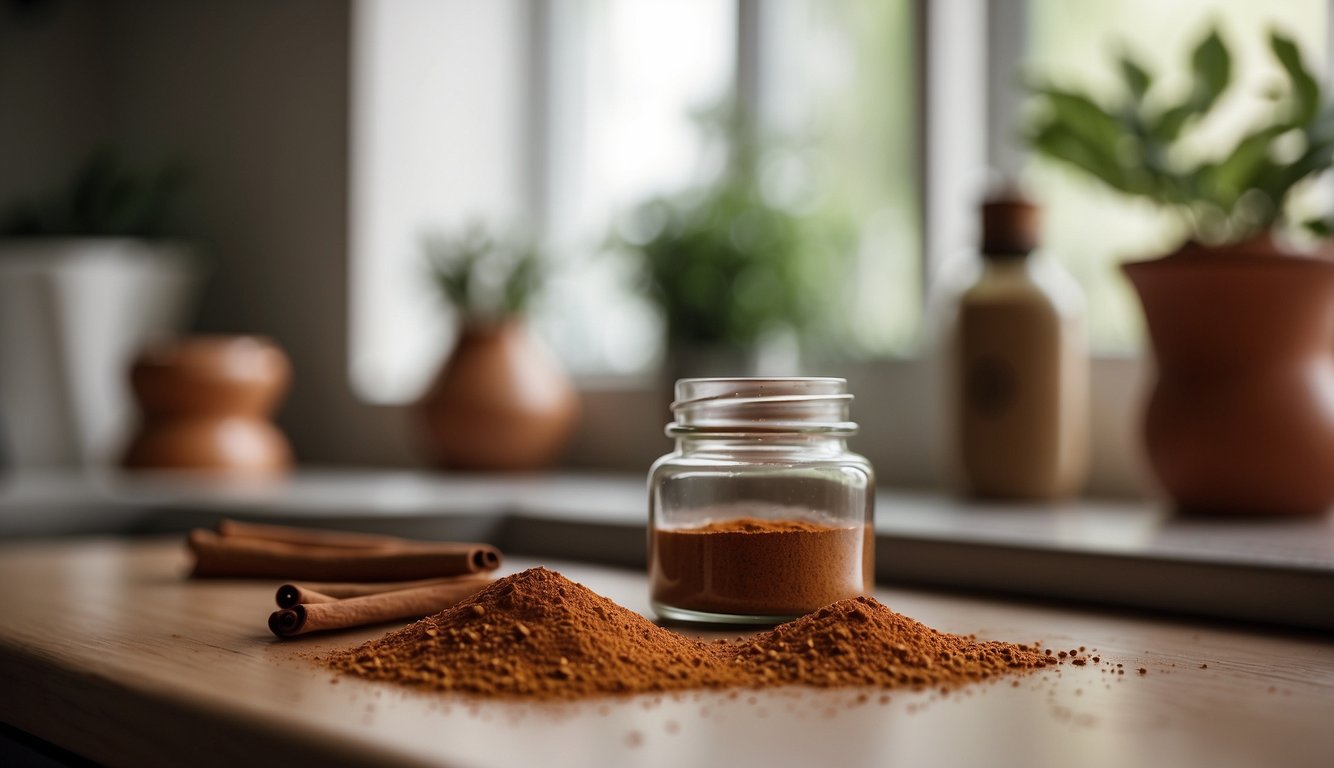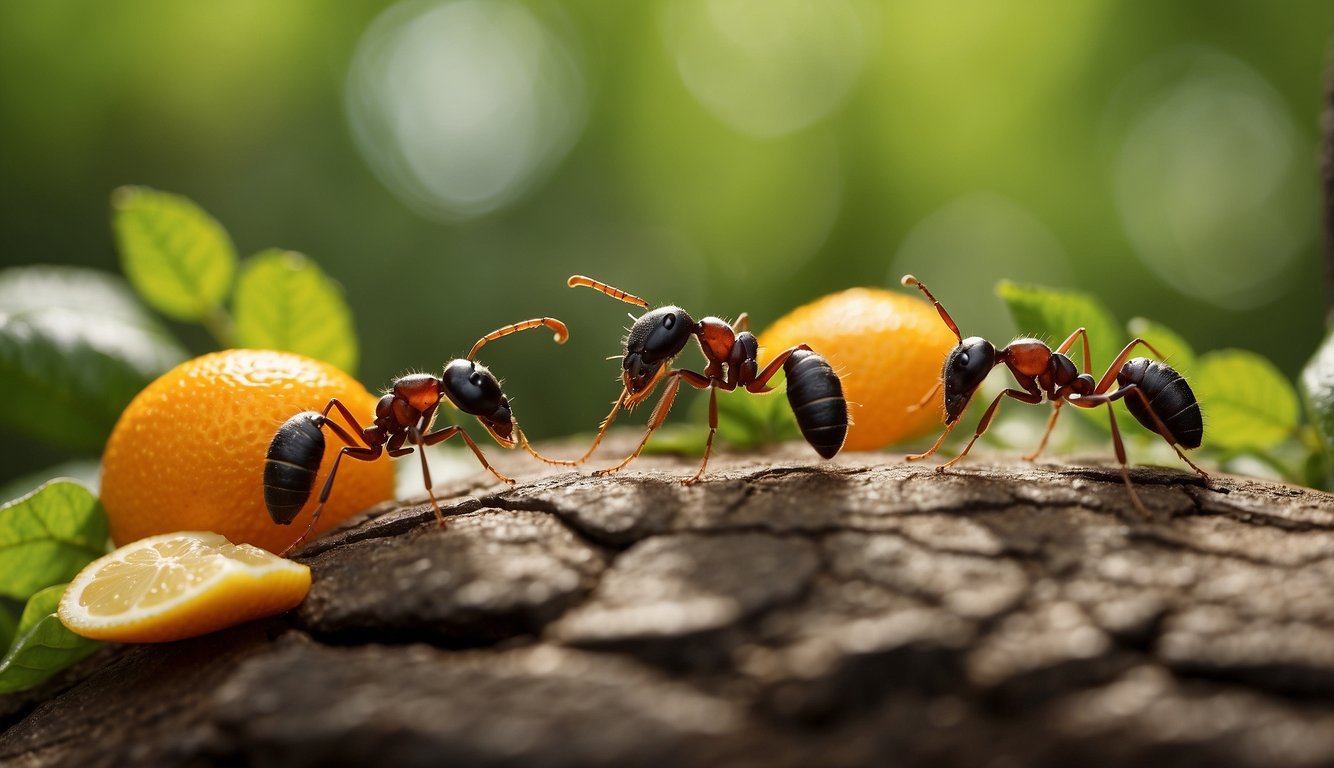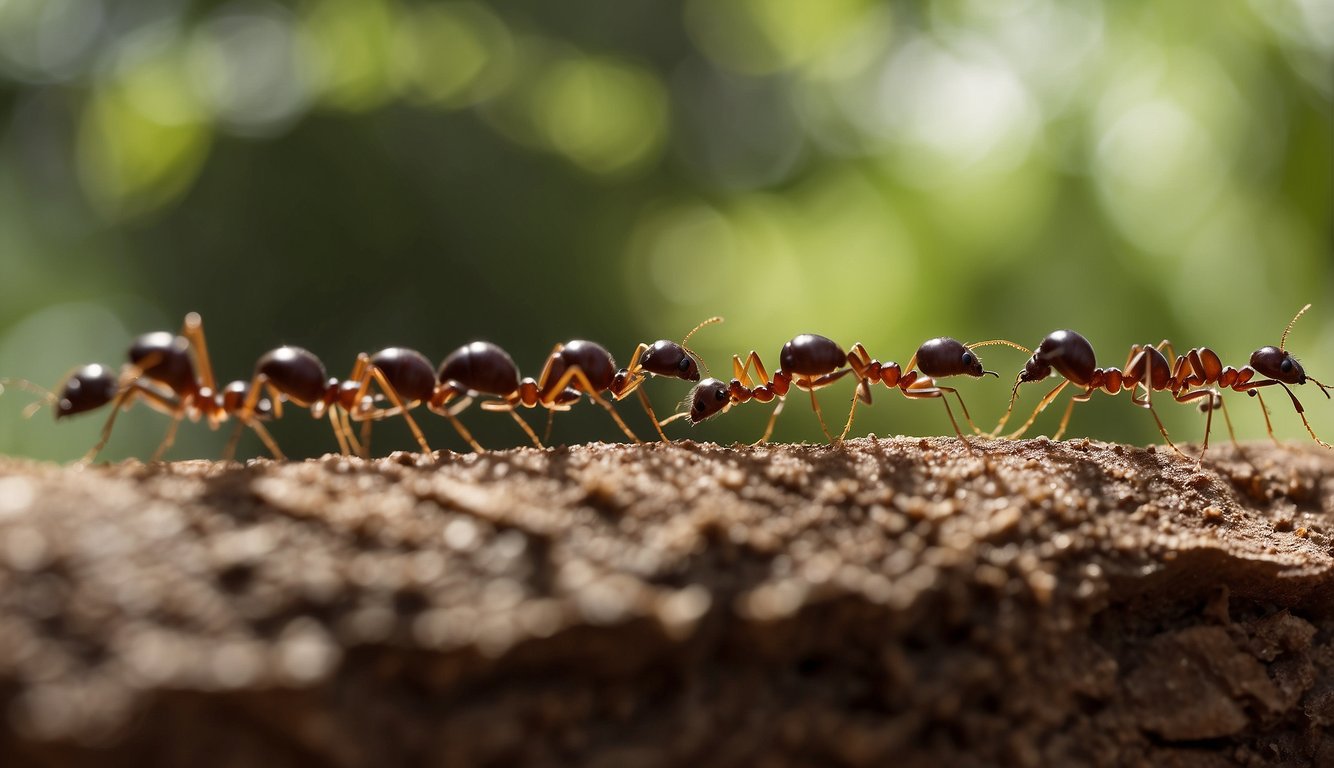TheHerbProf.com is a treasure trove of knowledge for those interested in natural healing and herbal remedies. The website is run by Paul Johnston MD. A naturopathic who has not only received extensive education in the field but also has personal experience in self-healing.
Natural ant deterrent is a great way to keep ants away from your home without using harmful chemicals. There are several natural ingredients that can be used to repel ants, such as cinnamon, vinegar, borax, lemon, and peppermint. These solutions are easy, cheap, and humane, and some of them can even kill the ants if you prefer.
One of the most effective natural ant repellents is cinnamon. Ants hate the smell of cinnamon and will avoid it at all costs. You can sprinkle cinnamon powder around your home or mix it with water to create a spray.
Another great natural ant repellent is vinegar. The strong smell of vinegar masks the ants’ scent trails, making it difficult for them to find their way back to your home. Simply mix equal parts of vinegar and water in a spray bottle and spray it around your home.
If you’re looking for a natural ant killer, borax is a great option. Borax is a mineral that is toxic to ants but safe for humans and pets. Mix borax with sugar and water to create a bait that the ants will take back to their colony, killing them in the process.
It’s important to note that while natural ant deterrents are effective, they may take longer to work than chemical pesticides. However, with patience and persistence, you can keep ants out of your home without harming the environment or your family.
Understanding Ant Behavior – Natural Ant Deterrent
As someone who has dealt with ant infestations before, I know that understanding ant behavior is crucial in finding effective ways to deter them naturally. Ants are social insects that live in colonies, and their behavior is guided by pheromone trails.
Carpenter ants, sugar ants, and other ant species have different preferences when it comes to food, moisture, and nesting sites. Knowing these preferences can help you identify and eliminate potential ant attractants in your home.
Ants are attracted to sweet, greasy, and protein-rich foods. They can detect even the slightest trace of food using their sense of smell. Once they find a food source, they leave pheromone trails for other ants to follow.
These trails can last for days, and even weeks, depending on the species and the conditions. By disrupting these trails, you can confuse and deter ants from returning to the same area.
To do this, you can use natural repellents such as vinegar, citrus oils, and essential oils. These substances mask the scent of food and interfere with the ants’ ability to communicate with each other.
You can also use physical barriers such as caulk, weather stripping, and mesh screens to seal off entry points and prevent ants from entering your home.
It’s important to note that different ant species have different behavior patterns. Carpenter ants, for example, prefer to nest in moist wood and can cause structural damage if left unchecked. Sugar ants, on the other hand, are attracted to sweet foods and can be a nuisance in the kitchen. By identifying the species of ants in your home, you can tailor your ant deterrent strategies accordingly.
Natural Ingredients That Repel Ants – Natural Ant Deterrent

As someone who has dealt with ant infestations before, I understand the frustration that comes with trying to get rid of them. Fortunately, there are natural ingredients that can help repel ants without the use of harmful chemicals. Here are two categories of natural ingredients that have been known to repel ants:
Spices and Herbs
Certain spices and herbs have strong scents that ants find unpleasant. Some of these include:
- Cinnamon
- Pepper (both black and cayenne)
- Peppermint
- Garlic
- Tansy
To use these ingredients as a natural ant deterrent, you can sprinkle them around the areas where you’ve seen ants or create a solution by mixing them with water and spraying it around your home. You can also create a sachet by filling a small bag with these ingredients and placing it near the entry points where ants are coming in.
Citrus Fruits and Peels – Natural Ant Deterrent
Citrus fruits and their peels contain limonene, which is a natural insecticide. This makes them effective at repelling ants. Some of the citrus fruits and peels that can be used as natural ant deterrents include:
- Lemons
- Oranges
- Orange peel
To use these ingredients, you can rub the peels around the areas where you’ve seen ants or create a solution by mixing citrus juice with water and spraying it around your home. You can also use essential oils made from these fruits to create a natural ant repellent spray.
While these natural ingredients can be effective at repelling ants, they may not work for every situation. If you have a severe ant infestation, it may be necessary to call in a professional pest control service.
DIY Ant Deterrent Recipes – Natural Ant Deterrent

As someone who loves natural solutions, I have compiled a list of DIY ant deterrent recipes that have worked for me. These recipes use common household ingredients and essential oils to repel ants naturally.
Vinegar Solutions
White vinegar is a versatile ingredient that can be used for cleaning, cooking, and as a natural ant deterrent. Here are two vinegar solutions that can help keep ants away:
- Vinegar Spray: Mix equal parts of white vinegar and water in a spray bottle. Spray the solution in areas where ants are entering your home or where they have been seen. The strong scent of vinegar will repel ants and make them avoid the area.
- Vinegar and Dish Soap Solution: Mix one cup of white vinegar, one tablespoon of dish soap, and one cup of water. Spray the solution directly on ants or in areas where they have been seen. The dish soap will help the solution stick to the ants and kill them.
Essential Oil Mixtures – Natural Ant Deterrent
Essential oils not only smell great but can also be used as a natural ant deterrent. Here are two essential oil mixtures that can help keep ants away:
- Peppermint Essential Oil Spray: Mix 10-15 drops of peppermint essential oil with one cup of water in a spray bottle. Spray the solution in areas where ants are entering your home or where they have been seen. The strong scent of peppermint will repel ants and make them avoid the area.
- Lemon Eucalyptus Oil and Castile Soap Solution: Mix 10-15 drops of lemon eucalyptus oil, one tablespoon of castile soap, and one cup of water. Spray the solution directly on ants or in areas where they have been seen. The castile soap will help the solution stick to the ants and kill them.
Borax Concoctions
Borax, also known as boric acid, is a natural mineral that can be used as an ant killer. Here are two borax concoctions that can help keep ants away:
- Borax and Sugar Solution: Mix one cup of hot water, one-half cup of sugar, and two tablespoons of borax. Soak cotton balls in the solution and place them in areas where ants are entering your home or where they have been seen. The sugar will attract the ants and the borax will kill them.
- Borax and Peanut Butter Solution: Mix one cup of peanut butter and one cup of borax. Roll the mixture into small balls and place them in areas where ants are entering your home or where they have been seen. The peanut butter will attract the ants and the borax will kill them.
Physical Barriers and Obstructions

Ants are tiny creatures that can find their way into our homes through the smallest cracks or gaps. One effective way to keep them out is by creating physical barriers or obstructions. Here are some natural options to consider:
Sealing Entry Points
The first step in preventing ants from entering your home is to seal off all entry points. This includes gaps around doors and windows, cracks in walls or floors, and holes in the foundation. Use caulk or another sealant to fill in any openings that ants could use to enter your home.
Natural Powders and Grains
Another way to create a physical barrier is by using natural powders and grains that ants dislike. These can be sprinkled around entry points or areas where ants are known to gather. Here are some options to consider:
- Baby powder: Ants are repelled by the scent of talcum powder, making baby powder an effective deterrent. Sprinkle it around entry points or areas where ants are present.
- Cornmeal and cream of wheat: These grains are not harmful to humans or pets, but they can be deadly to ants. Ants will eat the grains, but they cannot digest them, leading to death.
- Chalk: Ants are sensitive to the calcium carbonate in chalk, making it an effective deterrent. Draw a line of chalk around entry points or areas where ants are present.
- Talcum powder: Similar to baby powder, talcum powder can be used to repel ants. Sprinkle it around entry points or areas where ants are present.
Home Maintenance for Ant Prevention

As someone who has dealt with ant infestations in the past, I know how frustrating it can be to try and get rid of them. That’s why I’ve learned that prevention is key when it comes to avoiding these pesky insects.
Here are some simple home maintenance tips to help prevent ants from entering your home:
- Keep a clean home: Ants are attracted to food and crumbs, so make sure to keep your home as clean as possible.
- Wipe down countertops, sweep floors, and vacuum regularly. Don’t forget to clean up spills and crumbs immediately.
- Check for leaks: Ants are also attracted to moisture, so make sure to check for any leaks in your home.
- This includes pipes, faucets, and even your air conditioning unit.
- Store food in airtight containers: Ants can easily get into open food containers, so make sure to store your food in airtight containers.
- This will not only prevent ants from getting in, but it will also keep your food fresher for longer.
- Seal entry points: Ants can enter your home through even the tiniest cracks and crevices.
- Seal up any entry points, such as gaps around doors and windows, with caulk or weather stripping.
- Use natural ant deterrents: There are many natural ant deterrents that you can use to keep ants away.
- Some common options include vinegar, lemon juice, cinnamon, and peppermint oil.
- These natural remedies will not only deter ants, but they are also safe for you and your family.
Additional Natural Ant Control Methods

As effective as the natural ant control methods discussed earlier may be, there are still a few other techniques that can be used to repel ants from your home. Here are two additional methods you can try:
Diatomaceous Earth
Diatomaceous Earth is a natural insecticide that can be used to get rid of ants.
It is made up of fossilized remains of diatoms, which are tiny aquatic organisms.
When ants come into contact with the powder, it absorbs the waxy layer on their exoskeleton, causing them to dehydrate and die.
To use diatomaceous earth, sprinkle a thin layer of the powder in areas where ants are likely to travel, such as along baseboards, windowsills, and doorways.
Be sure to wear a mask and gloves when handling the powder, as it can irritate your lungs and skin.
Boiling Water Technique
The boiling water technique is a simple and effective way to get rid of ants.
Simply boil a pot of water and pour it directly onto ant hills or along ant trails.
The hot water will kill the ants and destroy their nest.
This method is best used on outdoor ant infestations, as pouring boiling water inside your home can be dangerous and cause damage to your flooring.
Be sure to take precautions when pouring boiling water outside, as it can also harm plants and grass.
Dealing with Specific Ant Types

As I mentioned earlier, different ant species have different preferences and behaviors. Therefore, it’s essential to identify the ant type before choosing the right natural ant deterrent. Here are some effective strategies for dealing with specific ant types:
Carpenter Ant Strategies
Carpenter ants are known for causing structural damage by chewing wood to create nests.
To prevent them from entering your home, you need to eliminate any sources of moisture and seal any cracks or gaps in your home’s foundation.
You can also use a mixture of equal parts water and white vinegar to wipe down surfaces where carpenter ants are present.
This solution will help repel them and remove their pheromone trail.
Sugar Ant Solutions
Sugar ants, also known as odorous house ants, are attracted to sweet and sugary foods.
To deter them, you can use essential oils such as peppermint, clove, or lemon.
You can also sprinkle cinnamon, black pepper, or cornmeal around their entry points to create a barrier.
Another effective method is to mix equal parts water and vinegar and spray the solution around the areas where sugar ants are present.
Fire Ant Tactics
Fire ants are known for their painful stings and aggressive behavior.
To prevent them from entering your home, you need to eliminate any sources of food and water.
You can also sprinkle diatomaceous earth around their entry points to dehydrate and kill them.
Another effective method is to pour boiling water over their nests to kill them instantly.
When to Call Professional Exterminators

As someone who prefers natural ant deterrents, I understand the hesitation to call professional exterminators. However, there are situations where calling in the professionals is the best course of action. Here are some instances where it’s time to call in the experts:
1. Ant Infestations: If you’re dealing with a severe ant infestation, it’s time to call a professional exterminator.
DIY methods may not be enough to eradicate the colony, and a professional can help you identify the type of ant you’re dealing with and recommend the best course of action for your specific situation.
2. Roaches: If you’re seeing roaches in your home, it’s time to call a professional exterminator.
Roaches can carry diseases and contaminate food, and they are notoriously difficult to get rid of.
A professional exterminator can help you identify the source of the infestation and take steps to eliminate it.
3. Structural Damage: If you’re seeing signs of structural damage, such as wood damage or cracks in the walls, it’s time to call a professional exterminator.
Some species of ants can cause structural damage to your home, and it’s important to address the problem before it gets worse.
While professional exterminators may use chemical methods to eliminate pests, there are eco-friendly options available.
Look for companies that use integrated pest management (IPM) techniques, which focus on prevention and non-chemical methods of control.
Pairing Natural Ant Deterrent with TheHerbProf
Let’s explore how our Natural Ant Deterrent guide and the herbal wisdom at theherbprof.com can work together.
Our Natural Ant Deterrent guide is your first step to an ant-free home. But what about the rest of the journey? That’s where theherbprof.com comes in. It’s your herbal encyclopedia, including natural pest control!
Picture this. You’ve followed our Natural Ant Deterrent guide and your home is ant-free. But you’re unsure about how to repel other pests naturally. No problem! Theherbprof.com has all the answers. It offers a wealth of information on how to use herbs for pest control. You can check our homepage here.
And there’s more! Theherbprof.com also shares the health benefits of various herbs. So, while you’re learning about ant control, you’re also discovering the power of herbs.
So, let’s get controlling with our Natural Ant Deterrent guide and let theherbprof.com guide us on this pest-battling journey.
References – Natural Ant Deterrent
Little Herb Encyclopedia, by Jack Ritchason; N.D., Woodland Publishing Incorporated, 1995
The Ultimate Healing System, Course Manual, Copyright 1985, Don Lepore
Planetary Herbology, Michael Tierra, C.A., N.D., Lotus Press, 1988
Handbook of Medicinal Herbs, by James A. Duke, Pub. CRP Second Edition 2007
The Complete Medicinal Herbal, by Penelope Ody, Published by Dorling Kindersley
Check the Following Articles!
Ground Sage Uses: Adding Flavor and Health Benefits
Rare Veggies: Uncommon Vegetables to Add to Your Diet
Types of Tomatoes: The Mega Guide to Tomato Varieties
Vegetable Beets: A Nutritious Root Vegetable for Your Diet
Frequently Asked Questions – Natural Ant Deterrent

What natural remedies can keep ants out of my home?
There are several natural remedies that can help keep ants out of your home. Some effective options include using essential oils like peppermint, cinnamon, and tea tree oil, sprinkling diatomaceous earth around entry points, and using vinegar or lemon juice to clean surfaces and repel ants. Additionally, sealing cracks and gaps in walls and floors can help prevent ants from entering your home.
How can I create a homemade ant killer for outdoor use?
One effective homemade ant killer for outdoor use is a mixture of borax, sugar, and water.
Mix 1 cup of warm water with 1/2 teaspoon of borax and 8 teaspoons of sugar until the ingredients are dissolved.
Soak cotton balls in the mixture and place them in areas where ants are present. Be sure to keep the mixture away from children and pets.
What scents are effective at repelling ants?
Several scents are effective at repelling ants, including peppermint, cinnamon, and citrus.
You can use essential oils or even fresh herbs like mint or basil to create a natural ant repellent.
Simply mix a few drops of essential oil with water and spray on surfaces or use cotton balls soaked in the mixture.
Is vinegar an effective solution for preventing ant infestations?
Vinegar can be an effective solution for preventing ant infestations.
Mix equal parts of vinegar and water in a spray bottle and use it to clean surfaces.
The scent of vinegar can help repel ants and erase any scent trails they may have left behind. However, vinegar may not be effective for eliminating an existing ant infestation.
What are the best strategies for dealing with ants in the kitchen naturally?
To deal with ants in the kitchen naturally, start by cleaning up spills and crumbs immediately.
Store food in airtight containers, and seal any cracks or gaps in walls or floors.
Use natural ant repellents like essential oils or vinegar to clean surfaces and repel ants.
If you have a severe infestation, consider using a natural ant bait or calling a pest control professional.
Can I eliminate an ant problem overnight using natural methods?
Eliminating an ant problem overnight using natural methods is unlikely. Natural methods may take longer to work than chemical pesticides.
It may take several days or weeks to see results. However, natural methods are safer for people, pets, and the environment and can be just as effective in the long run.


